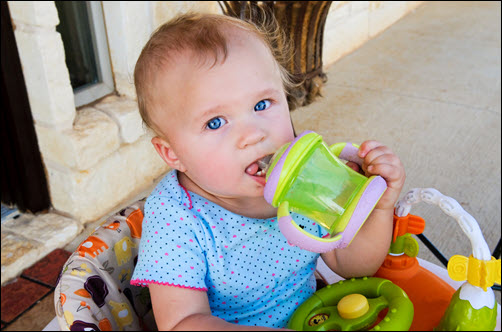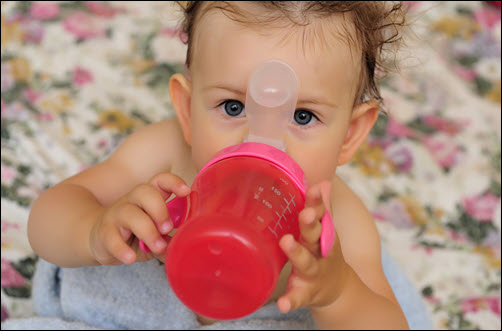Child Dental Health: Baby Bottles and Sippy Cups
Are baby bottles and sippy cups bad for your child? No. They are a practical solution for letting your child drink unassisted. However, the problem is not the container but what goes in it. Many babies and toddlers want something to suck on or drink as they wind down for a nap or night. But giving them a bottle filled with milk (other than breast milk), formula, juice, or any other sugary drink is cavities waiting to happen.
Scenario:
- A child can take a bottle or sippy cup to bed and drink from it until they fall asleep.
- The container is available for drinking throughout the sleeping period.

Result:
- They are bathing their teeth in whatever liquid is in the cup/bottle.
- Baby Bottle Tooth Decay occurs.
Baby Bottle Tooth Decay results from prolonged and frequent exposure to sugars and acids. The decay most often affects the front upper and lower teeth, though other teeth are not immune. And while these baby teeth are temporary, you still want them to be healthy.
Baby bottle tooth decay will manifest as white, dark, or dark brown spots on the teeth. In some cases, it may cause tooth sensitivity, thus causing your child pain. Short-term side effects are poor eating habits, speech problems, and crowded permanent teeth. Long-term results from baby bottle tooth decay are adult issues such as:
- Tooth pain
- Tooth malocclusion (misalignment)
- Chewing pain problems
Preventing Baby Bottle Tooth Decay
- Never put your child to bed with a cup or bottle of sugary liquid. If a bottle is necessary for your child to be comfortable, only give them water. Fluoridated water is even better. Also, do not let them walk around carrying a bottle filled with a sugary liquid. Constant drinking of juice, milk, etc., means teeth stay coated in cavity-causing elements.
- Wipe your child’s gums with a clean, damp cloth after meals and drinks.
- Don’t put juice, soda, sports drinks, or sugar water in your child’s cups/bottles. Stick with water, milk, or formula. Then, clean their gums afterward. Do not give your infant juice before they reach 12 months old.
- Take your infant to a pediatric dentist by the time they turn one. This gets them accustomed to the dentist and sets the baseline for dental care. It also provides insight into your child’s dental health and what you can do better.
- If your baby uses a pacifier, don’t dip it in sugar, honey, or syrup.
- Around six months old, start introducing a sippy cup to your baby. Ideally, you want to have them weaned from the bottle by age one.
- Use a baby toothbrush with a pea-sized amount of fluoridated toothpaste beginning at age 3.
Remember, the bottle and sippy cup are not the culprit! The contents, however, can be. If your child needs a drink to take to bed, it should be water only. This protects their teeth against cavities while providing the comfort they often want. Please contact our team at Forest Hills Dental Associates if you have questions regarding bottles, sippy cups, or other items. We would love to help you!

